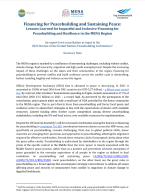
Financing for Peacebuilding and Sustaining Peace: Lessons Learned for Impactful and Inclusive Financing for Peacebuilding and Resilience in the MENA Region
There has been growing recognition by the multilateral system, including international organisations, donors and national governments, of the importance of local actors and their
networks as critical agents in peacebuilding and sustaining peace at the field level. Within the context of the Middle East, it is clear that the persistent absence of positive peacebuilding action rooted in local realities, experiences and needs contributes significantly to the fragility and violence across the region.
The localisation of aid however calls for a fundamental change in how aid is planned and delivered, challenging all actors to work differently and challenging the existing structures of the international, regional and national aid architecture to adjust their processes in a way that responds to local realities, experiences and needs.
The current context specifically calls for a change in donor behaviour, as donors have access to the processes that can shift the way peacebuilding is done at the local level.
The following key takeaways emerged from the discussion:
- There is a growing recognition of the need to localise peacebuilding action for impact: The participants recognised that there is a degree of conceptual ambiguity on what localisation is and what it entails. Generally, the participants agreed that localisation is about the shift of power. Localisation of peacebuilding and sustaining peace includes the following principles:
- Prioritising locally-determined priorities in financing strategies.
- Engaging with local peace and resilience actors as equal partners.
- Encouraging accountability for localisation.
- In the current political reality, donor coordination is essential for impactful local action: Lessons from existing donor coordination models provide several opportunities and challenges that need to be reflected on to allow for improvement in the quality of financing for peacebuilding:
- Donor coordination requires a coordination mandate.
- Donor coordination models must be context-specific.
- Coordination is effective with a small number of partners.
- Coordination requires transparency.
- The financing for peacebuilding landscape is shifting: Local peacebuilders in the MENA region assume that funding always comes with a political agenda. They are currently extremely suspicious of international partners and have lost confidence in some donors.
This summary note will inform a thematic paper to the UN Peacebuilding Architecture Review, in order to integrate examples and experience from the region into policy discussions around how donors can strengthen support for local peace and resilience actors.



